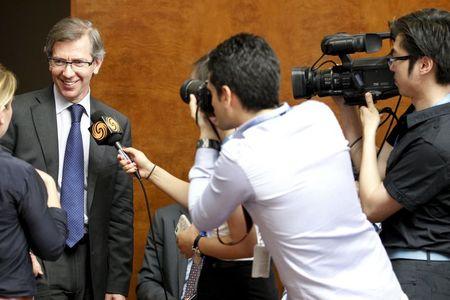Advertisement
U.N. urges Libyan factions to agree unity government this month
GENEVA/TRIPOLI (Reuters) - The United Nations special envoy to Libya called on the country's warring parties on Tuesday to agree on a national unity government by the end of August and endorse it with a vote in September.
Highlighting the risk that the talks, which have dragged on for almost a year, become irrelevant as the security situation worsens, Libya's rival governments flew air strikes against suspected Islamic State positions in two cities.
Libya is split between two governments backed by armed factions fighting each other but which control limited territory. Islamic State and other armed groups have exploited a growing security vacuum on the ground to expand.
Libya Dawn, an alliance of armed groups, drove the internationally recognized government out of the capital, Tripoli, and declared its own government a year ago, leaving the oil-rich country on the verge of anarchy.
"What Libya is facing now is deeper chaos and division ... So I hope all the Libyan actors will be wise, to avoid this scenario, to expedite the talks and to reach an agreement very soon," the U.N.'s Bernardino Leon, who opened two days of talks in Geneva, told a news briefing
"It is extremely risky to reach October without an agreement because we will be in a more chaotic situation. This is why it is important to have this time-line."
The input of armed groups on security arrangements was important, Leon said.
Some Libyan factions signed an initial U.N.-sponsored agreement in Morocco on July 12 to form a unity government and end fighting. A key player from the parliament in Tripoli, the General National Congress, stayed away then but is taking part in the Geneva talks, expected to last possibly until Thursday.
The U.N. proposal calls for a one-year government of national accord in which a council of ministers headed by a prime minister and two deputies would have executive authority.
Talks have been dragging on without a major breakthrough as both sides are under pressure from hardliners.
Planes loyal to the Tripoli government bombed Islamic State positions in Sirte, a central city, Jamal Zubia, a senior official in Tripoli, said in a message on social media. Islamic State seized control of the city in spring.
A helicopter belonging to the official government also attacked Islamic State on the outskirts of Derna, an eastern city, said a military spokesman. The militants have been trying to retake Derna after a rival group expelled them in June.
(Reporting by Stephanie Nebehay, Ahmed Elumami and Ayman al-Warfalli; Writing by Stephanie Nebehay and Ulf Laessing; Editing by John Stonestreet and James Dalgleish)



















Add new comment